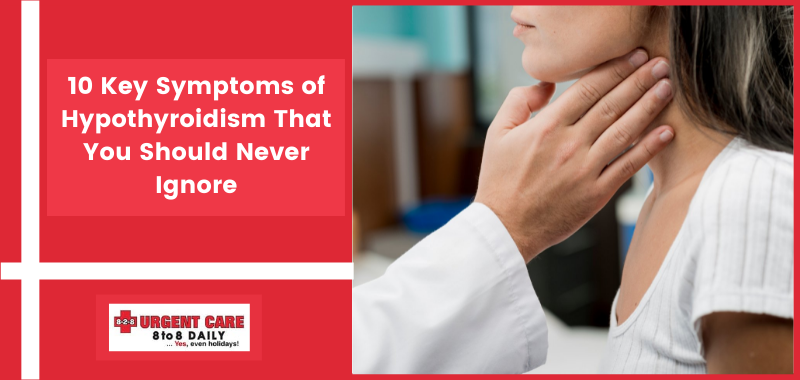


Also known as underactive thyroid, hypothyroidism is a condition where the thyroid gland is unable to produce adequate thyroid hormones that are crucial in regulating metabolism and other functions in the body. Low levels of thyroid hormones can cause many abnormal changes in the body. According to recent statistics, women are more likely to develop thyroid disorder than men.
During the early stages, you may not notice any symptoms. Therefore, it is important to stay alert as untreated hypothyroidism can lead to many severe complications such as heart disease, obesity, etc.
Hypothyroidism can be a result of the following conditions:
Removing a large portion of the thyroid gland can decrease or cease hormone production.
Also known as Hashimoto’s thyroiditis, this autoimmune disorder occurs when the immune system produces antibodies that attack your tissues and can often involve the thyroid gland.
The radiation used to treat head and neck cancers can affect the thyroid gland and cause hypothyroidism.
Those who produce excessive thyroid hormones are treated with anti-thyroid medications or radioactive iodine. Correcting hyperthyroidism can lower thyroid hormone production, resulting in permanent hypothyroidism.
Medications like lithium that are used to treat psychiatric disorders can contribute to hypothyroidism.
Related Article: 30+ Symptoms and Signs of Thyroid Disorder
Given here are the 10 most common symptoms of hypothyroidism:
The thyroid hormone controls the balance energy of the body. It can influence whether an individual feels ready to get up or simply nap. This hormone receives various signals from the brain and coordinates the cells to change their functions as per the state of the body. People with low thyroid levels often feel exhausted.
Hypothyroidism can decrease the basal metabolic rate, which can reduce the amount of heat the body generates. Hence, low thyroid levels can make you feel colder than those around you. According to recent studies, 40% of individuals with low thyroid feel sensitive to the cold.
Low thyroid levels can lead to metabolism switching modes causing reduced basal metabolic rate, resulting in your body storing more calories as fat. Low levels of thyroid can cause weight gain. Recent statistics state that people with hypothyroidism gained around 15 to 30 lbs in the year since their first diagnosis.
Since the metabolism switches to catabolism, the body starts breaking down tissues like muscle for energy. This can lead to decreased muscle strength which can cause weakness. Furthermore, the breakdown of muscle tissue can lead to aches all over the body.
Skin cells are largely affected by the thyroid hormone. This means that when the normal renewal cycle of skin cells is broken, the skin cells may take longer to regenerate. The dead skin may take longer to shed, which can lead to dry skin and flaking. In other cases, if an autoimmune disorder causes hypothyroidism, it can cause redness and swelling (myxedema) that can lead to itchiness.
Hair follicles have stem cells that are sensitive to low thyroid levels. Low thyroid levels can cause hair follicles to stop regenerating, which can result in hair loss. Furthermore, hypothyroidism can also cause coarsening of the hair in about 10% of people.
Recent statistics state that 64% of women and 57% of men who have hypothyroidism have reported having feelings of depression and about the same percentage of men and women also reported experiencing feelings of anxiety. Additionally, one of the most widespread causes of hypothyroidism is postpartum hormone fluctuations that can trigger postpartum depression.
Constipation has been a common complaint in people with hypothyroidism. Statistics state that 20% of people with hypothyroidism complained about their constipation getting worse compared to only 6% of people with normal thyroid.
Many people with hypothyroidism have complained of disturbed concentration. According to one study, 22% of individuals with low thyroid described having difficulty in doing everyday math, 39% reported having a poor memory, and 36% complained of slow thinking.
Since the thyroid hormone interacts with hormones that control the menstrual cycle, any abnormality in these hormone levels can disturb their signals. Furthermore, it can also affect the uterus and ovaries directly, and this can lead to heavy or irregular periods.
Are you suffering from all or a few of these symptoms? If yes, then it is best to seek medical help. The faster you control hypothyroidism, the easier it will be to mitigate the symptoms and lead a normal, healthy life.
If you’re suffering from hypothyroidism, please visit the 8-2-8 Urgent Care walk-in clinic in Oceanside, CA, for effective hypothyroidism treatment. Our doctors can diagnose the underlying cause of your thyroid disorder and help treat or manage it effectively.
Sources: Wiley, NLM, Healthline